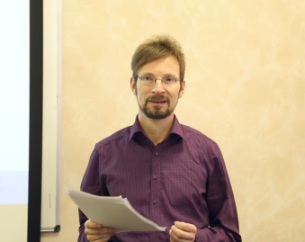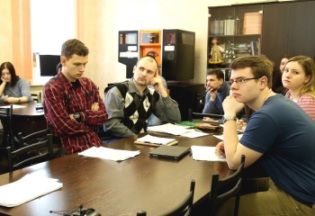Seminar held by Otto Habeck titled ‘Ethnology, French Style: the 20th Century’
 From February 27 to March 12, 2015, Otto Habeck, Professor of the Institute of Ethnology (University of Hamburg), carried out a series of seminars dedicated to the topic of ‘Ethnology, French Style: the 20th Century’ at TSU LSAR.
From February 27 to March 12, 2015, Otto Habeck, Professor of the Institute of Ethnology (University of Hamburg), carried out a series of seminars dedicated to the topic of ‘Ethnology, French Style: the 20th Century’ at TSU LSAR.
Joackim Otto Habeck graduated from the Free University of Berlin in 1996 and from Humboldt University (Berlin) in 1997. In 2004 he defended a doctoral thesis at the University of Cambridge, while participating in research projects at the University of Aberdeen (Scotland). From 2003 to 2014 Otto Habeck was a coordinator of Siberian Studies Centre of the Max Plank Institute for Social Anthropology in Halle (Germany). He also taught at the University of Warsaw, Rigas Stradina University, and Martin Luther University Halle-Wittenberg. Since 2014 he has been working at the University of Hamburg.
The seminar was open to the public and many students and fellows from TSU departments of history and philosophy, as well as fellows from other Tomsk universities – Tomsk Polytechnic University, Tomsk State University of Control Systems and Radio Electronics – ceased this opportunity. However, it was first and foremost designed for students of anthropology. An important (and extremely interesting) part of the seminar consisted in the discussion of materials and presentations prepared by the students according to a thematic plan. This allowed the maintenance of a balance between theoretical and practical classes which made the course not only informative but also intellectually saturated and useful for the development of cognitive and analytical skills.
 The combination of lectures and students’ systemic independent work helped specify and detail the topics in question. This approach proved especially beneficial taking into account the fact that the classes were held in both Russian and English. It is noteworthy that professor Habeck masters both languages and this also contributed to the substantive discussion.
The combination of lectures and students’ systemic independent work helped specify and detail the topics in question. This approach proved especially beneficial taking into account the fact that the classes were held in both Russian and English. It is noteworthy that professor Habeck masters both languages and this also contributed to the substantive discussion.
Main figures that the course by O. Habeck was focused on were French sociologists, philosophers and anthropologists that influenced the development of social sciences in the 20th century: E. Durkheim, M. Mauss, C. Levi-Strauss, P. Bourdieu, M. Foucault, and B. Latour. Particular attention was paid to the continuity in their work, the development and transformation of their ideas, the interrelationships and interdependencies which allow us consider the French anthropology as one continued research tradition despite the many branches of it. Having underlined Durkheim’s idea of dualism of the collective and the individual, the interaction of spirit and matter, the sacred and the secular, Otto Habeck went on reviewing the discreteness of the concept of ‘I’ by M. Mauss, the combination of person’s characteristics expressed in binary oppositions of light and darkness, good and bad, right and left (G. Bataille), and the analysis of the structure of social norms as an area of the unconscious (C. Levi-Strauss). These topics were further developed in lectures and seminars dedicated to the habitus and symbolic capital (P. Bourdieu), to the formation of social and political control (M. Foucault), and to the actor-network theory (B. Latour). The interaction of the personal and the public, the individual and the collective, and the psychological and the social was constantly the focus of the seminar participants.





 The project "Man in a Changing World. Identity and Social Adaptation: Past and Present" is funded by the Russian Government
The project "Man in a Changing World. Identity and Social Adaptation: Past and Present" is funded by the Russian Government 